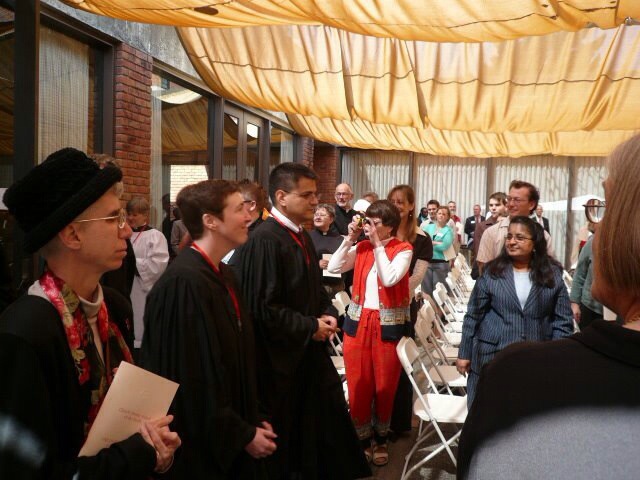As I read my friend Dan Joslyn-Siemiatkoski’s Facebook account of graduation at Church Divinity School of the Pacific (CDSP), I am brought to reflect on how CDSP and how the Graduate Theological Union (GTU) has changed since 1998 when I oversaw the accreditation of the GTUs nine seminaries and (at the time) twenty-one centers and independent research units. My office was situated on the second floor adjacent to the President’s office, whom I also served as special assistant. The Graduate Theological Union Library, the premier library of its kind, housing collections from all nine seminaries, also served the community of the University of California, Berkeley, whose charter specified a working relationship with an ecumenical and multireligious research facility — the GTU.
Until the 1990s, the GTU had operated on what could be called Fordist assumptions. It aimed at further integrating its faculties and campuses, closer ties among its many religious communities, active recruiting of new seminarians from underserved communities, expansion of its faculties to include more women of color, expansion of student housing so that students short on means could live comfortably in one of the most expensive rental markets in the country, expansion into the Pacific Rim, and deeper institutional collaboration among the boards and administrations of the GTUs many interdependent institutions. There was only one problem: resources. But with the many deep-pocket corporate executives sitting on its board, relationships assiduously cultivated by then GTU President Glenn Bucher, it seemed completely realistic that a pitch for further expansion and confessional integration would hit its mark.
But then, shortly after we issued our self-study and were awarded full ATS/WASC reaccreditation, there was a general house-cleaning at the GTU. There were good reasons for this house-cleaning, although the manner in which it was accomplished by John “the Axe” Dillenberger, the Interim President, left much to be desired. Glenn’s expansive institutional vision was replaced by parochial self-protection and contraction; and all at once the GTU was faced with the realities of post-Fordism: smaller, more flexible, temporary, transportable, more responsive to share-holders, but far (far) less responsive to stake-holders. To fit the new circumstances, President Bucher’s successor was not an icon of ecumenism, but a congenial and parochial Jesuit, eager to protect the private interests of each of the GTU’s separate institutions, but lacking the corporate connections that might have helped fund the coming generations of interreligious instruction.
Initially, of course, there was significant push-back from those in the GTU who continued to believe that the future should be filled with more, not less cooperation, not further contraction, but expansion of the ecumenical and interreligious vision. The library should be expanded. We should build a common campus at the intersection of Le Conte and Scenic. Cross registration among the seminaries and research institutes should be made more robust. Housing should be expanded. Aid for students and faculty, not just bricks and mortar, should be expanded. We should bring our tuitions more into line with our colleagues back east at Chicago, Yale, Harvard and Princeton. The GTU, gateway to the Pacific.
But over the course of the decade, as I moved on to teaching at Berkeley and my wife began her seminary instruction at CDSP, students, faculty and administrators all began to change their tune. Smaller and more stream-lined was better. Smaller, more flexible faculties featuring more contingent, temporary instructors were a good thing. And since we cannot offer full scholarships to seminarians any longer, or offer them free housing like our colleagues back east, we need to start offering more evening and weekend courses, more commuter opportunities, more online classes. But instead of framing these choices as responses to the overall economic downturn, neoliberal economic policies designed to increase institutional efficiencies and squeeze more out of less, members of the GTU community framed these choices as responses to the changing character of the religious communities that they served. Apparently parishioners did not want their seminaries to hire professors earning a living wage; apparently parishioners did not want their seminarians to be awarded stipends or housing so that they could devote themselves to their studies rather than to work-study. This was not a response to the economic downturn or to the prevailing neoliberal economic philosophy. It was a response to the increasing flexibility of the religious community, the increasing flexibility of the spirit; not to be mourned, but rather to be celebrated.
The GTU Library will soon be closed. CDSP’s faculty has been pared down to eight, mostly part-time or shared posts. Dan Joslyn-Siemiatkoski has accepted a permanent, full-time post at the Seminary of the Southwest in Austin, Texas.
My family and I live two blocks away from CDSP and from the GTU. We have been living in Bosnia and Herzegovina for the past year: Exhibit A in what happens to institutions under the conditions of post-Fordism. We will return to Berkeley this Fall to a GTU and CDSP much changed from the institution we left a year ago. When we return I expect that we will hear reports of what the spirit is doing at the GTU and CDSP, about how God is moving in mysterious ways. Few or any are likely see in this train of events evidence of a quite different spirit: the spirit of capital.

